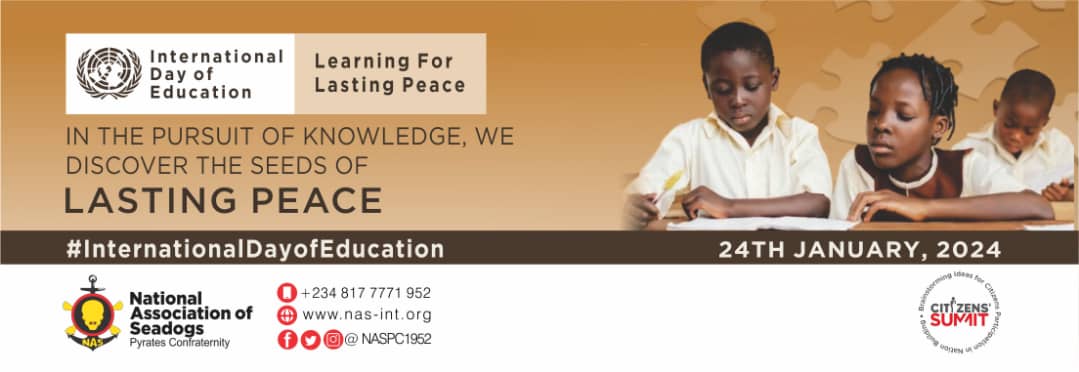It is with overwhelming somberness that the National Association of Seadogs, (Pyrates Confraternity) joins the global community in commemorating this year’s International Day of Education with the theme “Learning for Lasting Peace.”
On this auspicious day, we reflect on the metamorphic potential of education as a beacon of hope, and a potent tool for dismantling hate speech, cyber bullying, violent conflict, and sundry discriminations that plague our world today.
Education stands as a formidable force against the darkness of ignorance and intolerance. It is a catalyst for fostering understanding, empathy, and unity among diverse communities, and plays a critical role in building a foundation for lasting peace. Indeed, education serves as a counterforce to curtail poverty, hate speech, discrimination, and violence. By fostering a culture of learning that promotes tolerance, inclusivity, and critical thinking, we can dismantle the foundations of hatred and intolerance.
NAS/PC, therefore, emphasizes the need for educational curricula that promote diversity, respect for human rights, and the values of peace and unity. We hereby restate our decades-old conviction that education wields amazing transformative powers to pull down the manacles of grinding poverty which continue to threaten the future of children worldwide.
Seventy-two million elementary school age out- of- school children, and 759 million illiterate adults are a ticking time bomb that threatens the peace and stability of our world, and calls for urgent concerted efforts by all stakeholders.
While we advocate for the universal right to quality education, we cannot overlook the onerous challenges faced by Nigeria in this regard. The sorry state of education in our country is alarming, with an estimated 10.5 million children out of school; a situation that is worsened by a glaring dearth of quality teachers. This predicament hampers our nation’s potential for sustainable development and prosperity. With armed conflicts across vast spaces persisting, and showing no signs of abating, the out-of-school children in the country will remain an attractive recruitment pool for insurgents and perpetrators of violence, and other antisocial behaviour. The large number of out-of-school children in Nigeria is a pressing concern that demands urgent attention because the denial of education to any child is a denial of their fundamental right, and an impediment to the collective progress of our nation.
Furthermore, the insufficient number of well-trained and motivated teachers contributes significantly to the challenges faced by the education sector. NAS/PC therefore advocates initiatives that prioritise teacher training, support, and welfare to enhance the quality of education delivered to our children.
As we mark the International Day of Education, we call for collective action to prioritize education in Nigeria and globally. Investing in education is an investment in a peaceful, just, and prosperous future for all.
Nigeria’s government at all levels should gird its loins and substantially increase budgetary allocations to the education sector. Adequate funding is crucial to address infrastructural deficits, provide learning materials, and enhance the overall quality of education.
A review of the 2024 federal budget indicates that fiscal allocation to the education sector was N1. 54 trillion, representing 6.39 per cent of the total budget. Sadly, this falls far below the 15 per cent recommendation by United Nations Education Scientific and Cultural Organisation (UNESCO).
Even though the Universal Basic Education Commission (UBEC), has N251.5 billion as allocation in 2024 (marginally higher than the 2023 allocation of N149.7 billion), it is disappointing to note that Nigeria is yet to come to grips with the worrisome consequences of not funding the education sector for maximum results.
We call for the implementation and enforcement of policies that focus on bringing all children into the formal education system. Targeted interventions, such as scholarships and community outreach programmes, should be deployed to address the root causes of this problem. Beyond ensuring that every child, regardless of background, should have equal opportunities to learn and thrive within the educational system, Nigeria must embrace technology as an integral part of the learning process, implement initiatives that promote digital literacy, and ensure that learners of all ages have access to technology-enabled education, especially in the face of the evolving global educational landscape. Programmes should be integrated into the curriculum that foster tolerance, diversity, and respect.
Let us empower our youth with the knowledge and skills needed to build bridges, not walls, and to create a world where lasting peace prevails.
Abiola Owoaje
NAS Capoon
Abuja.


![[PRESS RELEASE] AFFIRMATION OF EMERGENCY RULE IN RIVERS STATE THROUGH “AYES AND NAYS”](https://www.nas-int.org/wp-content/uploads/2025/03/National-Assembly-Ayes-and-Nays-400x250.jpeg)

